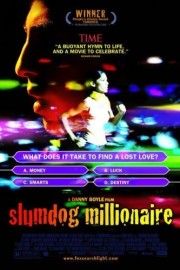Slumdog Millionaire
The first thing you think about Danny Boyle’s “Slumdog Millionaire”- besides “What a movie”- is, “The screenwriter of ‘The Full Monty’ wrote this?”. Believe it buddy. Of course, Simon Beaufoy is adapting the novel “Q & A” (by Vikas Swarup), so it isn’t an original work, but that doesn’t make the achievement any less stunning.
The film is structured like a mystery, as Jamal, an ill-read kid from the slums in Mumbai, is interrogated by a police chief (Irrfan Khan, equally ruthless and sympathetic). The reason? Well, Jamal (played by three equally-excellent actors throughout the film, as an “adult” by Dev Patel) go on as a contestant on the Indian version of “Who Wants to Be a Millionaire,” and- in an improbably run- is one question away from winning 20 million rupees. The show’s host (a cocky and terrific Anil Kapoor) is convinced he’s cheating; hence the call to the cops, who aren’t above “enhanced interrogation tactics” to get the truth out of him. What they get, in fact, is the story of how this underprivileged kid got to be the man he is today.
What we get is an emotionally-charged thriller unlike anything else you’ll see this year. Bond’s got nothing on this thing for suspense and excitement.
For that, you can thank Boyle, the Irish-Catholic maverick from Britain who- like last year’s Oscar darlings the Coen Brothers- never makes the same movie twice or an obvious one (even turds like “A Life Less Ordinary” or failed ambitions like “Sunshine” have a life of their own). “Slumdog” is no different, with Boyle blending the harsh super-reality of “Trainspotting” and “28 Days Later” with the hope of his 2005 film “Millions” in telling Jamal’s personal story, as well as giving us the larger picture of what growing up in the impoverished areas of India means. We follow intently as Jamal and his older brother Salim (also played by three actors, most indelibly by Madhur Mittal) are forced to fend for themselves on the streets through a series of events that help define their disparate personalities and the direction of their lives.
In these passages of the film, we’re reminded of Fernando Mierelles’ Brazilian powerhouse “City of God.” Counter-balancing that hopelessness is Jamal’s story, which finds meaning in his love for fellow slumdog Latika (played as an adult by a vibrant but captive Freida Pinto), who hits the road with he and Salim very early on. Jamal’s appearance on “Millionaire” isn’t so much an opportunity to change his life but to find her again.
Their unexpected love story is the beating heart of the movie, with Boyle and Beaufoy balancing the story’s gritty reality (brilliantly captured in the cinematography by Anthony Dod Mantle, given urgency by Chris Dickens, and a driving heart by A.R. Rahman’s visceral score) with the allure and fighting spirit of the greatest Hollywood underdog stories. What’ll grab you about “Slumdog Millionaire”- great title by the way- is the film’s palpable feeling of fending for yourself on the streets. What’ll sell you is its’ story of against-the-odds perseverance and scrappy soul. Either way, Boyle’s film has the makings of an unlikely classic.










